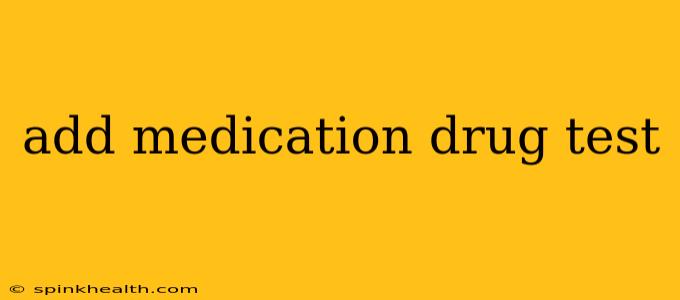Adding Medications to Your Drug Test: A Comprehensive Guide
The unexpected addition of medications to a standard drug test can be a confusing and stressful experience. Whether you're an employer needing to understand the implications, an individual facing a test, or simply curious about the process, this guide will unravel the complexities surrounding medication and drug testing.
We'll explore the common questions surrounding this topic, ensuring you have a clear understanding of how medications might affect your results and what steps you can take.
What medications might trigger a positive result on a drug test?
Many prescription medications can contain substances that might show up as positive on a standard drug test, even if they are entirely legal and prescribed by a doctor. This is often due to the overlapping chemical structures of some drugs and their metabolites (breakdown products) with those substances detected in standard drug tests. For example, some opioid pain relievers may trigger a positive result for opiates, and certain antidepressants may flag for amphetamines depending on the specific test used. This is why it’s crucial to always inform your employer or testing facility about your medication regimen.
How do drug tests detect medications?
Drug tests, predominantly urine tests, employ various methods to identify specific substances. These methods, like immunoassay, gas chromatography-mass spectrometry (GC-MS), and liquid chromatography-mass spectrometry (LC-MS), can detect even minute amounts of a substance. The sensitivity of these tests can lead to false positives, especially with medications that share chemical similarities to illicit substances.
Can I tell the testing facility about my medication?
Absolutely! It's crucial to disclose all medications you're taking to the testing facility or employer before the test. Transparency is key. Providing a doctor's note or prescription information can help clarify the situation and prevent misinterpretations. Failure to disclose your medications can lead to serious consequences, even if you have a legitimate medical reason.
What happens if my medication causes a positive result?
If a medication causes a positive result, the testing facility often re-evaluates the sample using more sophisticated testing methods like GC-MS or LC-MS to confirm the presence of the specific medication and rule out illicit substances. This process helps distinguish between legitimate prescription use and substance abuse. This secondary testing is often more expensive, so upfront disclosure is highly beneficial.
What types of drug tests are there, and how do they differ?
Several drug testing methods exist, each with varying levels of sensitivity and specificity. Urine tests remain the most common but can be vulnerable to adulteration. Hair follicle testing provides a longer detection window but may be less reliable for recent drug use. Saliva tests are less invasive but have a shorter detection window. Blood tests are the most accurate, detecting substances quickly, but they're more expensive and invasive.
Are there any specific medications that are more likely to cause a false positive?
Certain medications, especially those containing opiates, amphetamines, or benzodiazepines, pose a higher risk of triggering a false positive. This is why open communication with the testing facility is paramount. Be prepared to provide detailed information about your prescriptions.
What should I do if I get a positive result due to medication?
If you receive a positive result because of your medication, immediately provide documentation from your doctor confirming the prescription. It is in your best interest to proactively share this information before the test results are finalized. The testing facility or employer should review the documentation and likely reassess the situation.
Remember, honesty and transparency are critical. Open communication can help avoid misunderstandings and potential repercussions. By understanding the complexities of medication and drug testing, you can navigate this process with confidence. Always consult with your doctor or healthcare provider for guidance on managing your medications and addressing any concerns regarding drug testing.

